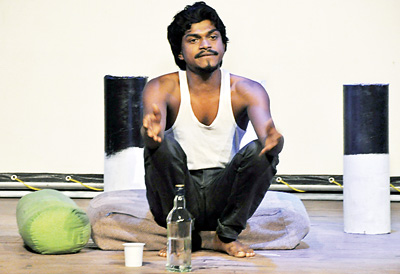Men can be men without the cloak of masculinity
“Voice of Men” was raised on behalf of women. The Foundation for Innovative Social Development (FISD) set the stage for men not ashamed to say that they care for their wives; love quality time with their children; are against gender based violence or, for that matter, gender stereotyping.

‘Don’t restrict us to the bottle”: A monologue with a messsage that vibrated across the hall. Pic by Nilan Maligaspe
The many monologues of this drama sequence held on a July evening were enacted entirely by men. They were all positive and encouraging. They all supported, basically, healthy relationships between men and women as opposed to power-based relationships.
A husband in the middle of arranging a surprise for his wife on their twentieth wedding anniversary questioned gender roles, and challenged women being manipulated, in a monologue addressed to the audience. He would have been every woman’s idea of a loving husband. However I was driven to think that he would also be called by others, somewhat disparagingly, a ‘family man’. One never hears of ‘family women’ however. Is the family the responsibility of the woman and not of the man? (You see the play is already giving me food for thought).
The next monologue was on drinking. It cleanly shattered the myth of ‘macho men who love their booze’. It revealed that men drink, not because they enjoy it, but due to social conditioning. The young actor’s imploration to society not to “restrict men to the bottle” vibrated across the hall.
Indeed the whole drama sequence was addressed to society with the aim of shattering limiting forms of masculinity. Each character challenged and ridiculed the “cloak of masculinity”. A skit with a father speaking of child-rearing, for instance, explained how when a man shuns that cloak it rewards him: he explains he is a man loving as well as loved.
The tables were turned when in another monologue a youth, reminiscing his first love affair, stated how unfair it is that men are expected to take the initiative on everything: from asking her out to first touching her to paying the restaurant bills.
In another skit, an Anglican priest finds out his daughter has sent a nude photo of herself to her boyfriend. The horrified man of God is tormented by biblical images of the Whore of Babylon for days, until he decides to forgive his daughter. He quotes Derrida’s words: “You have to forgive the unforgivable.” Men should not always be unbending is the message conveyed.
Throughout the drama sequence it was reiterated that the cloak of masculinity is harmful to women; to men; to everyone. It stressed the need, not so much for something as lofty as gender equity, but for men to give up their imposed masculinity which is poisonous to themselves just as for the others.


